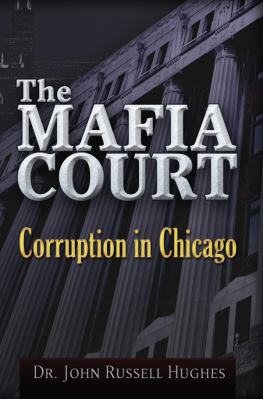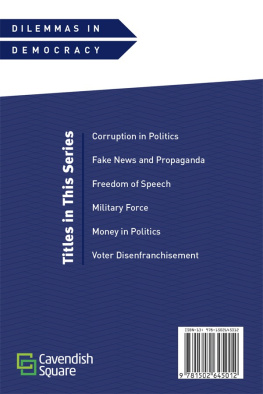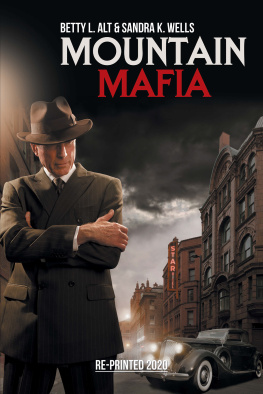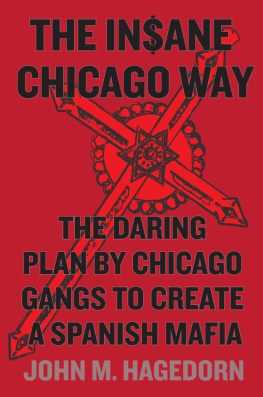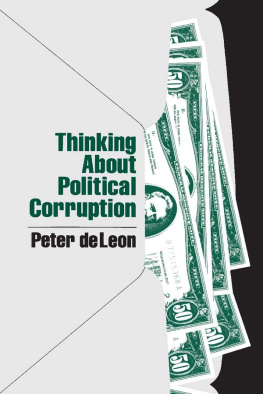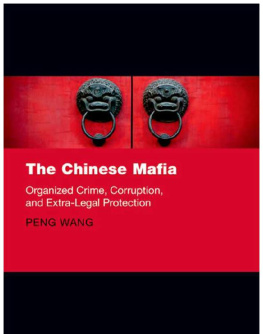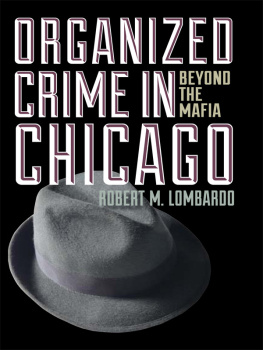

The Mafia Court: Corruption in Chicago
Copyright 2014 John Russell Hughes All Rights Reserved.
Presentation Copyright 2014 Trine Day, LLC.
Published by:
Trine Day LLC
PO Box 577
Walterville, OR 97489
1-800-556-2012
www.TrineDay.com
publisher@TrineDay.net
Library of Congress Control Number: 2013937962
Hughes, John Russell
The Mafia Court: Corruption in Chicago1st ed.
p. cm.
Includes references and index.
(ISBN-13) 978-1-937584-51-1 Print
(ISBN-13) 978-1-937584-52-8 Epub
(ISBN-13) 978-1-937584-53-5 Mobi
1. Mafia -- History. 2. Organized crime -- History. 3. Mafia -- Illinois (State) -- Illinois -- Case studies. 4. Organized crime -- Illinois (State) -- Illinois -- Case studies. 5. Political corruption. 1. Title
First Edition 10 9 8 7 6 5 4 3 2 1
Printed in the USA
Distribution to the Trade by:
Independent Publishers Group (IPG)
814 North Franklin Street
Chicago, Illinois 60610
312.337.0747
www.ipgbook.com
Hey, Sam, how about a loan?
Whattaya need?
Oh, about $500.
Whattaya got for collateral?
Whattaya need?
How about an eye?
Sam Giancana
Capitalism is the legitimate racket of the ruling class.
Al Capone
Ours is a government of checks and balances. The Mafia and crooked businessmen make out checks, and the politicians and other compromised officials improve their bank balances.
Steve Allen
To: Mary Ann Hughes, my beautiful wife, and my daughter and two sons
Table of Contents
Prologue
I want to tell you, my readers, about the origin of this book. In 2005, I wrote and published a book entitled, JFK and Sam , about the assassinations of President Kennedy and Sam Giancana and their relationship.
Early one evening, I received a telephone call from a man who said that he had read the book and wanted to talk with me about its contents. I invited him to come to my home that evening at 7:30 p.m. He called back and asked if he could bring his wife, and twenty minutes later called again asking if he could bring his secretary. I agreed to both requests.
At 7:30 p.m. a new Mercedes Benz pulled up in our driveway and a handsome gentleman appeared in his Armani suit, looking forty-five to fifty years of age. With him were two beautiful blondes in their early twenties.
Later, I found that these blondes were not the wife and secretary that they were supposed to be. It turns out that the father of this gentleman was a wealthy member of the Chicago Mafia and also a labor union president. His son, our visitor, was closely associated with the Mafia and personally knew most of the guys you read about in the newspaper.
That evening was very memorable for both me and my wife. We had a lively conversation about the Chicago Outfit and its contribution to the assassination of JFK, but an even livelier discussion about the assassination of Sam Giancana.
As a matter of fact, he said that he knew, and often saw on the streets of Chicago, the assassin of Giancana. My wife and I were both impressed with the charm of this gentleman who also was very articulate. After the three of them left later that evening my wife and I thought that this adventure was one of the most memorable times of our lives.
Five years passed. One evening the telephone rang and it was our Mafia friend. He had recently found religion, and through the Catholic Church had gotten to know a world-famous British Lord. Both were inviting me to write a new book about the corruption in the Chicago courts.
Especially because the invitation had come, in part, from the British Lord, I accepted the invitation. I thought that this would be an interesting task, although I was busy writing medical articles about the brain, my specialty. Since I had written my previous book about Sam Giancana and knew his history well, the plan was that I should review the evidence up to and including Giancana, and a co-author would handle the history from Giancana to the present.
Everything was going well during the first year of research and writing. Nearly every day I was in telephone and/or e-mail communication with the ex-mobster. Also, I had received encouraging e-mails from the British Lord.
Suddenly, everything changed. The ex-mobster was diagnosed with a serious illness, and telephone and e-mail communication nearly ceased. Also, my co-author was very concerned with the manuscript that he had already written about an unrelated topic, and which he was counting on the British Lord to help him publish.
The ex-mobsters background and character finally surfaced when he told my co-author, whom he had persuaded to be part of our project, that he needed to be paid thousands of dollars in order to keep his contact with the British Lord. My co-author was so desperate to keep this contact that he wrote out a check for the extorted amount. After reconsideration, he stopped payment on the check.
Extortion then was directed toward me. I was told that to continue the project, I needed to pay the ex-mobster the same amount of money. Of course, I was appalled after being asked to take on this project, and then to be told that I had to pay a significant sum of money to carry out the request that was made to me. As one might imagine, the co-author gave up on the project, and I decided to pursue the task by myself. Thus, this book was born through one of the Mobs favorite techniques extortion.
However, I am very pleased with the result and I sincerely hope that you, the reader, will also be pleased.
The Pioneers
Genna Brothers: 1910-1920
T he Genna family arrived in Chicago from Italy in 1910. They were known as tough individuals, and they created an organization called the Black Hand. There were many brothers, including Sam, Pete, Mike, Tony, Angelo and Jim. In 1919, just before the Volstead Act ushered in Prohibition, the Genna Family applied for a license to produce industrial alcohol. However, they occasionally substituted methyl for ethyl alcohol and added various other ingredients, referring to the product as scotch, rye or bourbon. They also added some glycerin to make the concoction smooth enough to be swallowed. The home distillery yielded 350 gallons of raw alcohol a week at a cost of 50-75 cents a gallon, which the Gennas wholesaled at $6/gallon. The retailer then reduced the strength by half with water. Each gallon yielded 96 bar drinks at 25 cents a shot, for a profit of $40 a gallon.
The Gennas paid off more than 400 policemen to escort the trucks that carried this booze. Also, they paid five police captains, scores of plainclothesmen, and special detectives assigned to the states attorney. Their distilleries were located within a few blocks of police stations and operated 24 hours a day. So many men in blue made an appearance in these warehouses that local people often nicknamed the booze plants the Police Station, located at 1022 Taylor Street. Maxwell Street cops were paid $10-125/mo. In no time at all, the Genna Family was grossing more than $300,000 a month, with net earnings at $150,000. Only 5% of this income went to graft.
Immigrants from Sicily had a special relationship with the Gennas, who paid Sicilian families $15 a day, 10 times what they could have earned at hard labor, to distill 50 gallons of corn-sugar booze. This arrangement was great as far as the Sicilian families were concerned, mainly because the Gennas were very much supported by the Unione. The full title of this organization was the Unione Siciliana di Mutuo Soccorso Megli Stati Uniti, founded in the early 1880s in New York, and eventually it proliferated into 32 branches around the U.S.A. This organization played a major role in the lives of people that had come from Italy, since they provided jobs, housing, insurance and burial benefits. Sicilian families paid weekly dues to the Unione and were also taught English to help them adjust to the American way of life. The Unione also functioned as mediator between the Sicilian immigrants and the American authorities.

